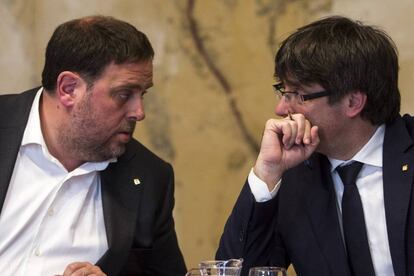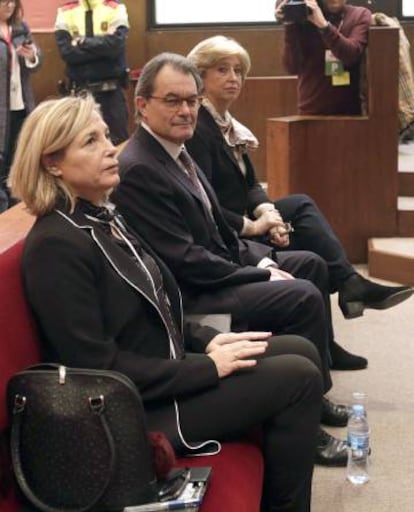Independence vote will be called in June, Catalan regional deputy insists
Oriol Junqueras claims courts have no powers to impede poll, which is fiercely opposed by Madrid
The deputy premier of Catalonia, Oriol Junqueras, said on Wednesday that an official referendum on independence for the northeastern Spanish region would be called in June, stating that the country’s Constitutional Court does not have the authority to suspend it, as it tried to do yesterday by freezing funds from the regional budget that would be used to organize the poll.

The central government in Madrid is fiercely opposed to a referendum on self-rule in the region, but the Generalitat, as the Catalan government is called, is pushing on with its plans despite legal obstacles and setbacks.
Speaking on RAC1 radio station, Junqueras explained that a request has been sent out by former Catalan Socialist Party (PSC) leader Joan Ignasi Elena to pro-independence parties to drum up as much support possible in Spain and Europe in the space of a few months for a pact with the Spanish government on a referendum. “They need time,” he explained. “They have asked us for a couple of months and from there we will set the date.”
This is a politicized sentence, it shouldn’t surprise us, because it’s a very politicized court ERC leader Oriol Junqueras
Junqueras, who is the leader of the Republican Left of Catalonia Party (ERC), also made his position clear on the legitimacy of the Constitutional Court to make such decisions. “This is a politicized sentence, it shouldn’t surprise us, because it’s a very politicized court that no other European democracy has,” he said, in reference to the fact that the court’s previous head, Francisco Pérez de los Cobos, is a member of the conservative Popular Party (PP), which is currently in power, albeit in a minority government.
“We are not scared,” he continued, going on to ask rhetorically: “Are they going to bar us from public office? Will they stick us in jail? Only they know, and Catalan society and the international [community] will know how they should respond.”
Will they stick us in jail? Only they know, and Catalan society will know how to respond Oriol Junqueras
Junqueras went on to say that he was sure that the PP government in Madrid would use all of its resources to impede a referendum, saying that it should “carefully weigh up the tools that they want to use.” In his view, Spanish law does not prohibit referendums, as the central government argues, and as such he criticized the interpretation of the Constitutional Court. “What the court is doing is suspending an intention, not something that can’t be done, but rather something that they don’t want to see happen in a certain way that it could be done.”
As part of Catalonia’s long-running drive for independence from Spain, an informal poll on independence was held on November 9, 2014, when Artur Mas was premier of the Generalitat. A number of court rulings put paid to the referendum having an official nature, but the vote went ahead regardless.

Around 2.3 million people voted out of an eligible voter pool of 6.3 million, according to the regional government’s own figures. Although 80% voted in favor of independence, it was dismissed by international observers as lacking sufficient guarantees of objectivity, given that it was organized and counted by pro-sovereignty activists and that many detractors of independence simply did not participate.
As a result of the vote, Artur Mas was recently barred from public office for two years by a court for using his position to hold the non-binding plebiscite. The former premier had “perverted democratic principles,” said the Catalan regional High Court, handing down the maximum possible sentence for disobedience. Ex-deputy premier Joana Ortega and ex-education chief Irene Rigau were also hit with bans from office – Ortega for 21 months and Rigau for 18 months – for their role in the “participatory process.”
English version by Simon Hunter.
Tu suscripción se está usando en otro dispositivo
¿Quieres añadir otro usuario a tu suscripción?
Si continúas leyendo en este dispositivo, no se podrá leer en el otro.
FlechaTu suscripción se está usando en otro dispositivo y solo puedes acceder a EL PAÍS desde un dispositivo a la vez.
Si quieres compartir tu cuenta, cambia tu suscripción a la modalidad Premium, así podrás añadir otro usuario. Cada uno accederá con su propia cuenta de email, lo que os permitirá personalizar vuestra experiencia en EL PAÍS.
¿Tienes una suscripción de empresa? Accede aquí para contratar más cuentas.
En el caso de no saber quién está usando tu cuenta, te recomendamos cambiar tu contraseña aquí.
Si decides continuar compartiendo tu cuenta, este mensaje se mostrará en tu dispositivo y en el de la otra persona que está usando tu cuenta de forma indefinida, afectando a tu experiencia de lectura. Puedes consultar aquí los términos y condiciones de la suscripción digital.








































